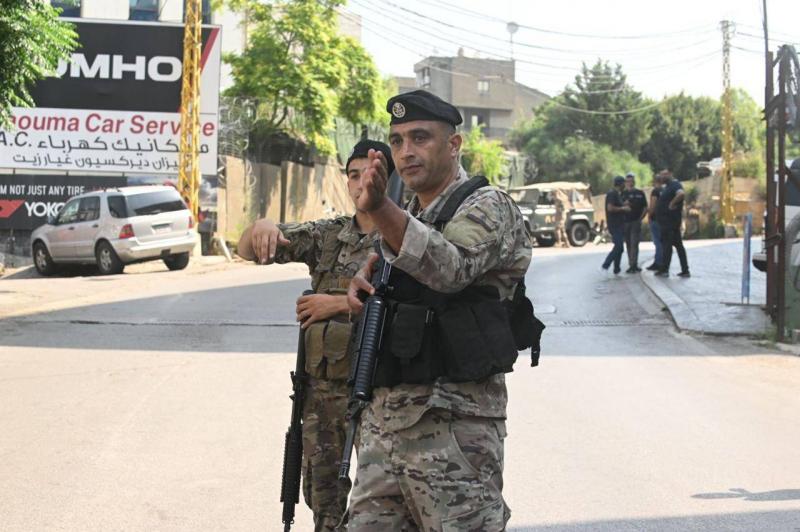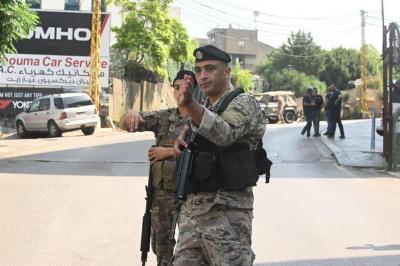The buzzing of at least 100 bullets fired by the Syrian Qais Farraj yesterday morning around the American embassy in Aoukar had not yet faded when questions arose about the "black box" of this dangerous attack with an AK-47, which heightened fears about what lies ahead for Lebanon, already walking a tightrope over the "volcano" of Gaza, with its lava looming over the "Land of the Cedars" from the southern gateway and its heated front. While Lebanon was tightening its belts to confront Israeli threats, loud declarations indicated that the schematic drawing for a "strong operation" against it and "Hezbollah" was ready, and that Tel Aviv's shift from defense to attack on its northern front needed only "to pull the trigger," the armed assault on the American embassy stole some of the spotlight from the escalating southern events, an occurrence cloaked in hidden agendas and backgrounds disguised under the banner of "extremists" or "ISIS."
As monitoring intensified regarding the fates of the southern front in light of the raging "fire war," which seems to outline a burning "scorched earth" on both sides of the borders, forcing Tel Aviv into a corner of coercive options oscillating between a comprehensive war it cannot afford to conduct, and "fighting days" south of the Litani that might be "the sweetest of the bitter" as a prelude to a "Caesarian" birth for the "next day" (in Lebanon), it became difficult to separate the "Aoukar operation" from the larger stage on which the entire Lebanese situation unfolds. In fact, informed circles consider the fiery message at the American embassy as a mere reflection of the "murky waters" in both politics and security in a country ravaged by crises and resisting the burning ember of Gaza and its fierce war.
Despite the shooter's arrest and the efforts to save his life after he sustained injuries to his leg and abdomen, which resulted from his neutralization by the Lebanese army (he underwent surgery at the military hospital), and the initial threads of the assault revealing that the attacker, who claimed to have carried out the operation "in support of Gaza," is part of a group of extremists allegedly connected to "ISIS," further investigations are awaited following the arrests of five involved individuals in the Bekaa. This development has significant implications, both in itself and in its potential dimensions, which swiftly presented "two versions," each linked to the atmospheres of the "resistance" and opposition camps.
Among these implications:
- Regardless of the attack's background, it represents a major security breach on two levels. The first was articulated by Lebanese Interior Minister Bassam Mawlawi, revealing that "the attacker transported explosives from Majdal Anjar to Aoukar," noting that "the attacker passed several checkpoints, which is surprising," adding, "We are investigating the entities standing behind the attack." Reports state that he reached the vicinity of the embassy in a van he took from Bekaa, concealing weapons, a bag, and a helmet inside. He reportedly wore "camouflage" in an area that is currently being identified before he opened fire near the embassy, where it was also reported that he threw a grenade, injuring one of the guards, who is Lebanese.
The second level concerns the security of the embassy's vicinity, which is expected to be entirely secured, especially after the security measures were intensified since the outbreak of the Gaza war, and this location became a target for rallies and demonstrations denouncing U.S. support for Israel. Notably, the embassy's entrance was subjected to gunfire on September 20, 2023, by a Lebanese gunman who managed to escape and was captured a few days later in southern Beirut; his attack was attributed to a personal dispute with the embassy guards concerning "treatment in a degrading manner."
It is worth mentioning that Washington is expanding its embassy in Aoukar by constructing a new, massive complex that began in 2017, covering an area of 174,000 square meters, nearly two and a half times larger than the land occupied by the White House and more than 21 football fields, at a cost of one billion dollars. The Aoukar embassy previously suffered a car bomb attack on September 20, 1984, resulting in 11 deaths and 58 injuries. Its premises were relocated from Beirut (the city's waterfront area in the Ain al-Mreiseh region) to Aoukar following a suicide bombing on April 18, 1983, which killed 49 staff members and injured 34.
### "Lone Wolves"
- The slogans inscribed on the bag and clothing of Farraj, including "Islamic State, lone wolves, there is no victor but God, ISIS," combined with the discovery of explosive devices and materials manufacturing bombs in the home of Qatada Farraj (the attacker's brother) in Majdal Anjar, although they indicate a likely connection to "ISIS," have led following circles to take note that the attacker, who evidently did not have anyone with him during the operation that lasted about half an hour (until the Lebanese army succeeded in neutralizing him), did not wear a suicide belt and his behavior was not "suicidal." It should be noted that the raids conducted by the Lebanese army, State Security, and the Information Division of the Internal Security Forces in the Bekaa (Majdal Anjar and Al-Suwari) led to the arrest of five individuals, including Farraj's brother, his father, and Sheikh Malik Jahha, an imam of the Abu Bakr Al-Siddiq mosque in Majdal Anjar (it was reported that the attacker was receiving religious education from him).
- Farraj, who lives in a rented house located in the town of Al-Suwari, is registered on the lists of the UN refugee agency, which includes the names of Syrian displaced persons.
- The "presence" of both the displacement issue and "ISIS" (the army arrested a group in the north over a week ago) in the embassy attack has deepened fears that the events unfolded as an attempt to exploit the "tinder" already embedded in the Lebanese reality, which serves as "fuses" ready to ignite at any "matchstick" such as the displacement issue to fuel resentment regarding this file and push the Lebanese situation towards a greater degree of chaos. Moreover, there are dangers in portraying that displacement is being used as a means to form latent extremist or ISIS cells being equipped with complete gear and capable of moving freely and reaching their "targets safely," making them susceptible to being "awakened" towards one agenda or another.
### The Backstage Path of the South War
In the opinion of informed circles, the main danger in this context is that the promotion of the "Syrian ISIS factor" within the Lebanese situation at this time is linked to a message related to the backstage path of the war in the south, specifically the American attempt to reach an agreement concerning the Lebanese front and arrangements after any truce or cessation of war in Gaza. This path still faces difficulties related to security stipulations, whether regarding Tel Aviv's insistence on keeping "Hezbollah" away from the border by about 10 kilometers or rejecting Israel's commitment that the final "border agreement" would halt its aerial violations, or perhaps allow them to be "hidden," in a manner similar to "what is unseen is non-existent," by having drones fly at "invisible" altitudes, as conveyed by envoy Amos Hochstein to Druze leader Walid Jumblatt.
Hence, there is concern that the embassy attack, according to the same circles that are adversarial towards "Hezbollah," may serve as a warning that failing to exert sufficient pressure on Israel, or believing that what Tel Aviv could not achieve in the field could be extracted diplomatically, might cost Lebanon a slip into chaos from a "soft flank" represented by extremist or terrorist activity. This scenario contradicts Washington's desire, which is viewed as the primary brake on Israel from expanding the conflict with Hezbollah.
Conversely, a climate has emerged in atmospheres not far from the "resistance" suggesting that yesterday's embassy operation and the accompanying official and political denunciations, alongside its revelations of the strong U.S. presence in Lebanon, will lay the groundwork for increased toughening regarding displaced persons, causing security chaos and tightening the noose around Lebanon to force it to accept the conditions of the American settlement, lest chaos unfolds.




